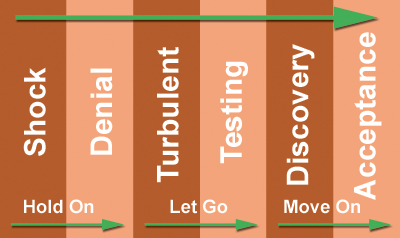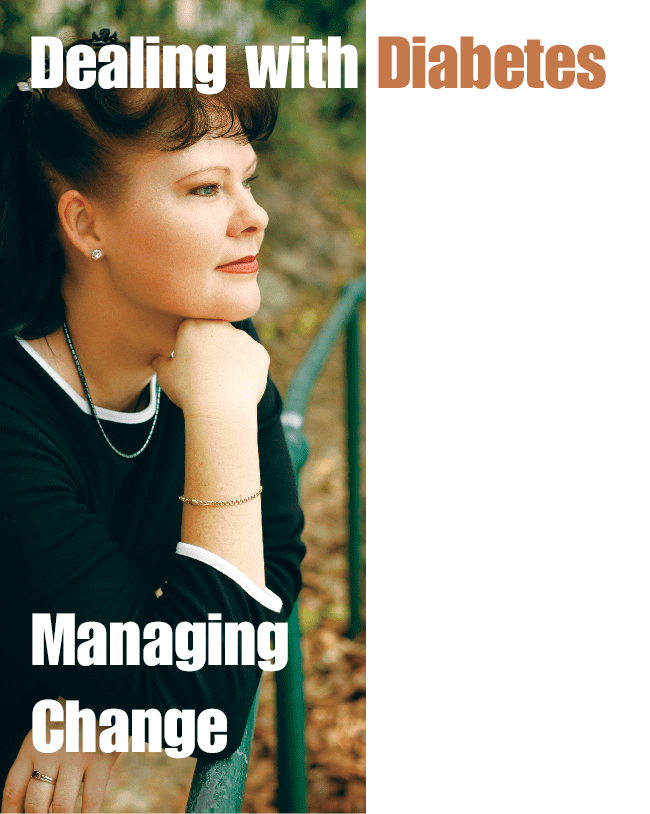The diagnosis of diabetes represents a major change in the life of that person as well as the lives of family members and friends. Change is a fundamental part of our life and progress as humans. Change happens, be it the change of seasons, growing up from a child to an adult or the evolution of technologies and tools enabling us to do our work. The diagnosis of diabetes can be one of those changes and as a chronic disease it is permanent and must be dealt with. Everyone will deal with it differently, but accepting change as a normal part of life is very important to managing diabetes and preventing potential health complications. Adapting to change associated with diabetes is very much a question of attitude. You can be an active participant in your care and be positively affected or you can deny that changes are happening and bet on the outcome… so change or be changed.
We all tend to get into a comfort zone and are afraid to change our settings because we have developed habits and built all sorts of values to protect our comfort zone. In doing so, we often become attached to our comfort zone and, if it is lost or taken away, it can be traumatic. This can happen with the diagnosis of diabetes as many new behavior patterns must be adopted and old ones abandoned. Having diabetes means that you need to plan your meals, increase physical activity, and take medication. It will seem difficult at the beginning, but step by step you will learn how to manage the changes in your life.
Learning how to manage diabetes and a changing lifestyle is a major change. Managing change that is caused by diabetes is similar to any other change in our life that we did not anticipate or plan for. To effectively manage change, it is worthwhile to familiarize yourself with the different stages that people go through during a major life transition. Each stage is associated with varying emotions as well as the opportunity to learn and take action. Keep in mind that not all people go through the same phases.

Shock, Anger and Guilt
When a change is first experienced there is a reaction of shock or surprise. This can initially make a large demand on our energies. This can lead to quiet withdrawal or extrovert demonstrations. Also during this phase individuals lose focus and feel dazed. The shock then could give way to anger. It is perfectly normal to feel this way at times, but you won’t help yourself by remaining angry and hostile all the time. Try talking to family members, friends or others with diabetes to get these feelings out. Consider directing the energy you’re using on anger to something positive by volunteering for diabetes organizations. You might also feel guilty and ask yourself, why do I have diabetes? Have I done something wrong? The answer is no. We know that the vast majority of the tendency to diabetes is genetically transmitted. Therefore, rather than blame yourself for where you are at, it is better to think of what you can do to control your diabetes and make your health better.

Denial
In this phase, individuals begin to behave as though the change is not present. ‘I don’t have diabetes's or ‘I just have a touch of diabetes's are typical responses. Denial is a significant obstacle to managing diabetes as it prevents you from taking good care of your health. Denial can be dangerous. It is normal to deny things that frighten us. Accept this initial fear, experience it and then move on. Fear and worry will not change your circumstance. People with diabetes can have a normal life; you are not less than anyone else. You are not alone. If there are ten people in a room then two of them probably have diabetes and most likely two others have it and don’t know. There are more than 170 million people with diabetes worldwide.

Turbulent Time
This phase is accompanied with a significant drop in the individual’s energy levels, along with mixed feelings of blaming oneself and others for one’s suffering, panic, dread, helplessness and apathy. This is a critical stage if you have diabetes. First, eliminate the blame. You are not responsible for your disease and some things are out of your control. You are responsible for your health however, and many tools are available to help you manage diabetes effectively. Secondly, be sure to keep talking to family and friends. Get out and visit. Think of all the good things in your life and take it one day at a time as you work on managing your blood sugars in this new phase of your life.
Testing and Experimenting
In this phase people will try different ways to accept and cope with the change. This may be the first time positive energy is expressed, as the individual starts to let go of negative feelings associated with the change. The goal in coping with diabetes is acceptance. This allows you to feel good about yourself and to move forward with the management of your disease. It is normal for old feelings of guilt, anger or fear to surface. Gather strength and think about what allowed you to accept diabetes the first time. Do not pressure yourself. Think positively, set small goals, keep faith and maintain a sense of humor.Discovery and Learning
During the exploration phase there is a feeling of chaos or disorganization as individuals try to work out what the future might mean for them. There is a lot of uncertainty and stress associated with this phase, particularly among those who have a need for order and structure. Others find it an exhilarating time and a spark to their creativity, as they look for ways to get the most from the future. As you learn more about your diabetes you’ll realize that much of the information is a guide and you will have your own unique experiences. Experiment and learn what works best for you. This is true for emotional well-being as well as blood sugar control.
There is a lot of uncertainty and stress associated with this phase, particularly among those who have a need for order and structure. Others find it an exhilarating time and a spark to their creativity, as they look for ways to get the most from the future. As you learn more about your diabetes you’ll realize that much of the information is a guide and you will have your own unique experiences. Experiment and learn what works best for you. This is true for emotional well-being as well as blood sugar control.